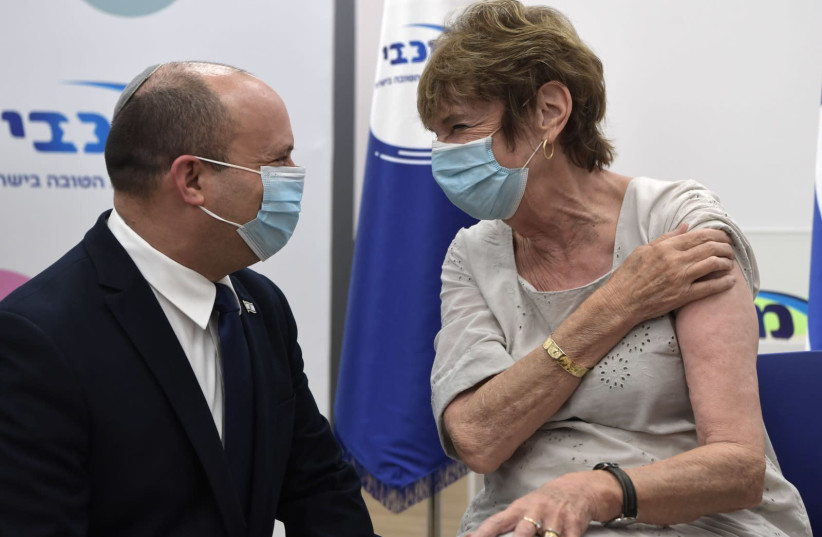Naftali Bennett’s 5 reasons for giving a third COVID-19 shot in Israel
PM Naftali Bennett went against the WHO's recommendation by approving the booster shot for the COVID-19 vaccine.

PM NAFTALI BENNETT accompanied his mother Mirna to get a third COVID-19 booster shot, August 3, 2021
Prime Minister Naftali Bennett laid out five reasons
why his government decided to approve COVID-19 booster shots for all
Israelis over the age of 12 in an opinion piece that was published over
the weekend in The Economist.
In
the 1,400-word column, the prime minister attempted to justify Israel’s
decision to go against a request by the World Health Organization to
refrain from handing out boosters until more of the middle- and low-income world was vaccinated, and to do so ahead of any regulatory approval.
His
column was published on the same day that a top advisory team to the US
Food and Drug Administration ruled there was not enough evidence to
give boosters to everyone, and rather approved only giving the shots to
people over the age of 65 or those who are at highest risk for
infection.
What were Bennett’s five reasons?
1) COVID-19 is a war
“Fighting
a pandemic is like fighting a war, where the strategic decisions must
not be made by the experts, the generals, but by the elected government,
taking into account a broader picture,” Bennett wrote. He
said that the coronavirus pandemic impacts nearly all areas of people’s
lives, from the economy to education, from supply chains to mental
health and therefore needs to be looked at from a holistic perspective.
And whereas public health experts “tend to be conservative and
risk-averse,” COVID-19 requires “quick decisions” and “decisive action. “Sometimes, not making risky decisions can be more damaging than taking a calculated risk,” the prime minister wrote.
2) The vaccines were not working anymore
In
February, Israelis started to believe the country had beaten the
pandemic. The economy opened up, weddings and cultural events resumed
and people removed their masks. But only a couple of months later, cases
began to rise – including among those who had been fully vaccinated.
According to Bennett,
there were two reasons for this: First, the Delta variant was so
virulent that it was capable of overcoming the vaccine’s defenses;
second, the effect of the vaccine, which began being administered in
Israel on December 20, 2020, had started to wane among people who
received it more than five months prior. Moreover, those who got vaccinated would likely be at increased risk.
“People
with two doses can be at increased risk because they think and act as
if they’re fully protected, even when that protection may be waning,”
Bennett said.

President
Isaac Herzog and Prime Minister Naftali Bennett are seen kicking off
Israel's third booster shot vaccinations at Sheba Medical Center, on
July 30, 2021
3) The vaccines are safe
Israel
had a lot of information about the side-effects of the Pfizer vaccine,
which at this stage has already been administered in some capacity to
more than six million Israelis, according to Bennett.
“We knew the vaccines worked and their side-effects were minor,” said the prime minister.
A
study of more than 9,000 Israelis published last week by Maccabi
Healthcare Services found that 87% of people experienced at least one
side-effect, most often pain at the injection site. However, none of the
side-effects were life-threatening and they usually went away within
one to three days.
Half
the people said the side effects were worse for the third shot than the
second, and half said they were the same or not as bad. The second-most
reported side-effect (57%) was weakness and fatigue.
Previous
studies of the first and second doses conducted in Israel and abroad
also found minimal side-effects among the majority of recipients.
4) To avoid another lockdown
When
cases began rising, the prime minister was being pressured by some
health and political leaders to consider a fourth lockdown. Even as
Israel inched closer to the High Holy Days, it seemed shutting down was
still on the table. But
Bennett said he knew another lockdown would “further harm our economy
and society,” he wrote in The Economist. So, instead, he decided to
“double down on vaccines as the central strategy, together with less
restrictive measures such as a face-mask mandate in closed spaces and
the ‘Green Pass’ scheme that requires people to carry proof of being
vaccinated or negative test results in order to participate in various
activities.”
5) Not moving forward would erode public trust and feed the anti-vaxxers
“When
twice-dosed people are infected and fall ill, it erodes the public’s
trust in the vaccines and discourages others from getting vaccinated,”
Bennett said. He
said that allowing the vaccines to wane is not only dangerous but
provides “fodder for the anti-vaxxers and conspiracy theorists.”
Third COVID shot boosts immunity tenfold - Israeli study now peer-reviewed
The rate of confirmed infections and of severe cases of COVID-19 was more than 10 times lower among people who received the booster compared to people who did not.
htthttps://www.jpost.com/health-and-wellness/coronavirus/third-covid-shot-boosts-immunity-tenfold-israeli-study-now-peer-reviewed-679591?_ga=2.35468001.1716020406.1632037506-1229034299.1617710680&utm_source=ActiveCampaign&utm_medium=email&utm_content=Did+the+Mossad+assassinate+Iran+s+chief+nuke+scientist+with+an+AI+gun%3F&utm_campaign=September+19%2C+2021+Day&vgo_ee=Jn367jKILnpErXAAhCpdDovy7T5YEJ8ohjC9vauJg30%3D
Did 1 in 500 US Residents Die From COVID-19 by September 2021?
A total of nearly 664,000 people were lost to the virus in the United States by Sept. 14, 2021.
Claim:
By September 2021, one COVID-19 death had taken place for every 500 people living in the United States.
Rating ---- TRUE
